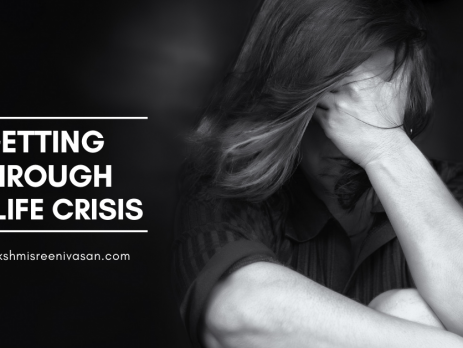
Remember the movie ‘The Seven Year Itch’, where middle-aged Richard Sherman is dissatisfied with his life and deeply drawn towards a beautiful young girl? Or the movie ‘Death Becomes Her’, where the protagonists are so insecure about getting old that they strike an uncanny deal to make them youthful and attractive? The above might be some examples of midlife crisis in reel life but in real life too, men and women around the age of 40 to 64 undergo this phase. It is a testing time that is ridden with conflict and anxiety, often leading to a need for drastic alterations.
What you go through in midlife crisis
From time to time, we all get unhappy and are plagued with various negative thoughts. The difference with a midlife crisis is that there is a strong turmoil brewing within, making it harder to go on with life as one usually would. As per studies conducted by economists Terence Cheng, Nick Powdthavee and Andrew Oswald, there is a U-shape pattern when it comes to the well-being of humans. The research states that by around the age of 40 to 42, the happiness quotient dips to its lowest.
Midlife crisis is a time of reflection and contemplation, where there is an urgency to alter life. This often results in a sudden urge to do something drastic. Mild instances are a man investing in a fancy sports car or a woman undergoing botox. In ‘The Survival Papers: Anatomy of a Midlife Crisis’, author Daryl Sharp explains, ‘ A midlife crisis, like an acute neurosis, is characterised by conflict, depression and anxiety.’ He goes on to elaborate that this period is marked by the sudden appearance of atypical moods and behaviour patterns. Jim Conway in his book ‘Men in Midlife Crisis’ too backs that, citing that it is a time of high risk for marriages and potential career disruption. He explains this phase saying, ‘There is depression, anger, frustration, and rebellion. The crisis is a pervasive thing that seems to affect not only the physical, but also social, cultural, spiritual and occupational part of man’s life.’

Some of the symptoms are:
- Constantly looking back to the past
- A need to feel and look young again
- A longing for a sense of adventure
- Wanting to change your life
- Comparison with successful colleagues
- Questioning the decisions that have been made in the past
- No longer feeling the same about what used to make you happy once
- A nagging feeling of lack of accomplishment
- Regret over goals that have not been accomplished
- Bouts of nostalgia
- Day dreaming
- Having a rebellious streak
- Inability to make decisions about what one wants in life
- Being impulsive with alcohol, drugs or food
- Increased or decreased weight
- Being obsessed with physical appearance
- Having a sexual affair, especially with someone younger
- Desire for a new relationship filled with passion
- Resentment or anger with the current state of affairs with marriage, job, health, etc
How to cope up with it
Remember, midlife crisis is not the end of the road. The good news is that there are positive ways to cope up with it. Here are some of them:
Change your perception
This testing period should not always be looked as an ominous predicament. You can contemplate on what you really want to do in life and take corrective measures. Says Jim Conway in his book, “A midlife crisis is really an opportunity to fulfill all of the potential of our personality. It’s an opportunity to look at reality, get rid of unnecessary junk that may have limited our lives, and make full use of our experience and our expertise.”
Just because you feel it does not mean that you need to act on it
You might want to run away from your family and job, but you do not have to act towards it. While you may want to change certain aspects in your life, it is important to not give into rash impulses. Before plunging into something dramatic (for instance, binge drinking or having an affair), take a pause and consider if what you are doing is really worth it or is it adding value to your life in any way. Also, many times, these feelings pass away with time.
Ask yourself, are your wishes realistic?
The age 40 and beyond certainly does not mean that you should put a lid on your ambitions, whether it is travelling the world or learning something new. Just ensure that there is a realistic angle to your desire and it is within your grasp.
Identify the source of your stress
Get in touch with what you are really feeling and identify the source of your stress. By doing that, you will solve the problem at its core rather than act out irrationally and cause more damage. Writing your thoughts down and talking to someone you are comfortable with can help.
Exercise
Exercise is a golden remedy that works for almost any emotional ailment. Conducive to physical as well mental well-being, physical activity is time and again proven to get rid of stress and depression. Keeping aside just 20 minutes a day can make a world of a difference. Also, many tend to get depressed due to their change in appearance with aging. Being fit ensures that one is in their best form.
Find a positive way to release your frustrations
Holding on to your past and grudges against people will only prove a deterrent to your overall happiness. Find a positive way to release your frustrations, it can be spending quality time with your dear ones or pursuing a hobby that gives you a sense of joy. Appreciate all the good things of the present.
Nurture yourself
Instead of resourcing to negative elements to make yourself better, turn to nurturing yourself. Give priority to yourself when it comes to health and emotional well-being. Focus on yourself, eat well and surround yourself with positivity.
Seek counselling
Counselling can help on several levels. It can aid in understanding the true source of the problem, clearing your mind and also giving you a sense of direction. If you feel that you are spiralling downwards in anxiety and depression, it is best to seek professional help at the earliest.
By the end of it, it is essential that you acknowledge what you are going through. Think of midlife crisis as a transformative phase that brings with it a great scope for growth where you can set new goals and revisit new ones.

